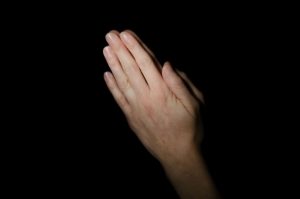In June 2016, we explored the lives of the Sisters of St. Margaret, an Episcopal order of sisters based in Duxbury, Massachusetts. During this current season of staying at home – for longer periods of time than most of us ever imagined – much has been written about silence, isolation, loneliness, and other results of our response to the COVID-19 pandemic.
Here we will more fully explore the value of silence, especially “spiritual silence,” in our American culture – a culture that, sadly, is based on hypercapitalistic values, consumerism, the bottom line, globalization, and financial success. There may be lessons to be learned by “spiritual silence” that can help offset the downsides from pandemic, economic downturn, high unemployment, fear, quarantine, social disruption, despair and even death. We may even be able to take those lessons into our busy lives after the coronavirus crisis has eased.
 In recent years, national polls have found that, while most Americans believe in God, our participation in organized religion has been declining. At the same time, books on spiritual issues are hitting the best-seller list; we are in many ways seekers and doubters trying to believe in something. Is there any safe haven in our culture that can help us deepen our spirituality in an atmosphere of peaceful, welcoming hospitality?
In recent years, national polls have found that, while most Americans believe in God, our participation in organized religion has been declining. At the same time, books on spiritual issues are hitting the best-seller list; we are in many ways seekers and doubters trying to believe in something. Is there any safe haven in our culture that can help us deepen our spirituality in an atmosphere of peaceful, welcoming hospitality?
For centuries, convents and monasteries have been places of prayer, contemplation, hospitality, and devotion to God. Those who take religious vows and live in these places abide, wholly or in large part, in silence. Monks and nuns work, pray and listen to the Divine in serene surroundings, apart from the distractions of blaring horns and screeching brakes.
Through their daily services or “offices” – Morning Prayer, Eucharist, Noonday Prayer, Evening Prayer, and Compline – which, in the Anglican tradition, follow the Book of Common Prayer, monks, nuns and their guests follow an ages-old routine that provides structure, discipline, and a serene anchoring of one’s life. The office includes the reading or chanting of words of Scripture, prayers for the world, thanksgivings, petitions for forgiveness, and hymns of all kinds.
Among the most powerful words that break the silence during the office are the Psalms, sometimes spoken and sometimes chanted. The Psalms have been “adopted” by Christianity but are original to Judaism. Composed and recited orally over several centuries, the Psalms (which number 150 of varying lengths) are compelling because they span the human experience and human emotions – especially praise, gratitude, and lament. As priest and spiritual teacher Cynthia Bourgeault notes, praying and especially chanting the Psalms were the mainstay of the devotional life of the desert fathers of the ancient church. The Psalms form the basis of the entire office in the Anglican and other traditions and “grow” on a participant, even if she or he has been saying the Psalms in other settings for a lifetime.
 How might a guest spend a typical (non-pandemic!) day at a convent or monastery? Many guests “go on retreat,” spending much of their time in private prayer and study; they may also meet with a sister or brother who is trained in spiritual direction. Convents and monasteries come in many shapes and sizes, but most have a variety of quiet sitting rooms, benches on the grounds, and libraries for reading and meditating. Often candles, icons, prayer books, hymnals and other helps are available to guests to support their times of renewal.
How might a guest spend a typical (non-pandemic!) day at a convent or monastery? Many guests “go on retreat,” spending much of their time in private prayer and study; they may also meet with a sister or brother who is trained in spiritual direction. Convents and monasteries come in many shapes and sizes, but most have a variety of quiet sitting rooms, benches on the grounds, and libraries for reading and meditating. Often candles, icons, prayer books, hymnals and other helps are available to guests to support their times of renewal.
Visitors generally participate in most, if not all, of the daily chapel services. Meals are taken in common two or three times a day, usually in silence; this may be disconcerting at first, but one comes to appreciate the quiet parts of the daily rhythm. On festive occasions when “talking meals” take place, monks, nuns and guests often find themselves engaged in lively conversations; many nuns and monks lived in the world before they entered religious life so are no stranger to everyday joys and challenges.
The silence of the convent or monastery is one of its most precious assets. It is not the silence of death, of void, of nothingness. It is, rather, the silence of possibility and expectation: what will the Divine say to me today? In this silence, one can listen better – to one’s own needs and desires, to the needs of others, and most of all to the still, small voice of Divine Love. However we understand the Divine, convents, monasteries and retreat centers are gracious gifts to 21st-century seekers of spiritual nourishment.
^ This post is adapted from Valerie Abrahamsen, “Monastic Silence and Spiritual Nourishment,” first published in the “Take on Faith” series in The Original Vermont Observer, April 12, 2006.
For Further Reading
Bourgeault, Cynthia. Centering Prayer and Inner Awakening. Lanham, MD: Cowley Publications, 2004.
Bridges, Erich. “Amid isolation and silence forced by a pandemic, ‘We’re all monks now.’”
Galambos, Colleen. “The Public Health Epidemic Exacerbated by COVID-19.”
Hillis, Gregory. “We’re all monks now.”
Murphy, Roland E., O. Carm. “Psalms, The Book of,” in Bruce M. Metzger and Michael D. Coogan, eds., Oxford Companion to the Bible, 626-29. New York and Oxford: Oxford University Press, 1993.
